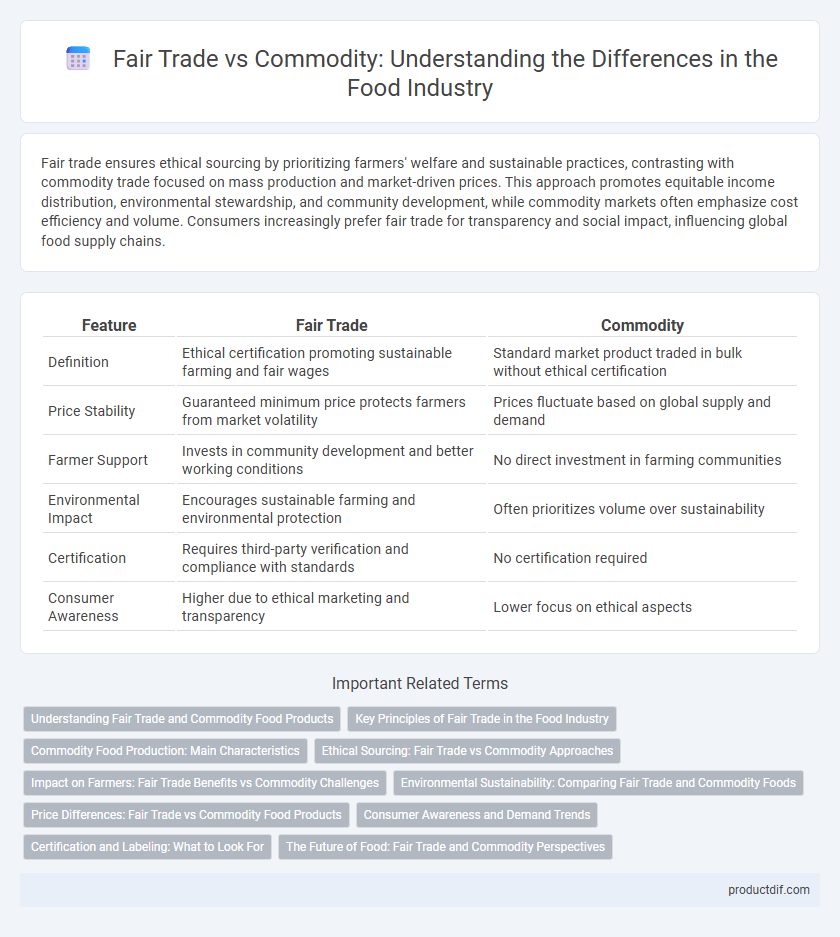Fair trade ensures ethical sourcing by prioritizing farmers' welfare and sustainable practices, contrasting with commodity trade focused on mass production and market-driven prices. This approach promotes equitable income distribution, environmental stewardship, and community development, while commodity markets often emphasize cost efficiency and volume. Consumers increasingly prefer fair trade for transparency and social impact, influencing global food supply chains.
Table of Comparison
| Feature | Fair Trade | Commodity |
|---|---|---|
| Definition | Ethical certification promoting sustainable farming and fair wages | Standard market product traded in bulk without ethical certification |
| Price Stability | Guaranteed minimum price protects farmers from market volatility | Prices fluctuate based on global supply and demand |
| Farmer Support | Invests in community development and better working conditions | No direct investment in farming communities |
| Environmental Impact | Encourages sustainable farming and environmental protection | Often prioritizes volume over sustainability |
| Certification | Requires third-party verification and compliance with standards | No certification required |
| Consumer Awareness | Higher due to ethical marketing and transparency | Lower focus on ethical aspects |
Understanding Fair Trade and Commodity Food Products
Fair trade food products prioritize ethical sourcing, ensuring farmers receive fair wages and work under safe conditions, contrasting with commodity food products that are typically mass-produced and traded primarily based on price fluctuations in global markets. Fair trade certification often guarantees transparency, sustainability, and community development, while commodity foods focus on high-volume production and efficiency. Consumers seeking socially responsible options often prefer fair trade products, valuing the emphasis on equitable trade practices and environmental stewardship.
Key Principles of Fair Trade in the Food Industry
Fair trade in the food industry emphasizes equitable trading conditions, ensuring farmers receive fair wages and work under safe, sustainable environments. Key principles include transparency, environmental sustainability, and community development, differentiating fair trade products from standard commodity goods often subject to market volatility. Certification systems like Fairtrade International enforce these standards, promoting ethical sourcing and empowering small-scale producers.
Commodity Food Production: Main Characteristics
Commodity food production primarily revolves around large-scale farming operations focused on maximizing yield and efficiency to supply global markets. This system emphasizes standardized crops such as wheat, corn, and soybeans, often relying on mechanization, chemical inputs, and monoculture practices. The goal is to produce high volumes at low costs, frequently resulting in environmental concerns and limited benefits for small-scale farmers.
Ethical Sourcing: Fair Trade vs Commodity Approaches
Ethical sourcing in the food industry contrasts sharply between fair trade and commodity approaches, with fair trade prioritizing social and environmental standards that benefit marginalized producers. Fair trade certification ensures farmers receive fair wages, fosters sustainable farming practices, and promotes community development, while commodity sourcing often emphasizes cost efficiency and large-scale production with less regard for ethical considerations. This fundamental difference impacts supply chain transparency, consumer trust, and long-term ecosystem health in global food markets.
Impact on Farmers: Fair Trade Benefits vs Commodity Challenges
Fair Trade ensures farmers receive a stable, fair price, empowering them to invest in sustainable practices and improve living standards. Commodity markets often expose farmers to price volatility, leading to financial instability and limited bargaining power. This disparity intensifies challenges in poverty alleviation and sustainable development within farming communities.
Environmental Sustainability: Comparing Fair Trade and Commodity Foods
Fair Trade foods promote environmental sustainability through strict standards that limit pesticide use, encourage organic farming, and support biodiversity conservation. Commodity foods often rely on large-scale industrial agriculture, which can lead to soil degradation, water pollution, and higher carbon emissions. Choosing Fair Trade products reduces environmental impact by fostering eco-friendly practices and sustainable resource management.
Price Differences: Fair Trade vs Commodity Food Products
Fair trade food products typically command higher prices than commodity food items due to ethical sourcing, certification costs, and premium wages for farmers. Commodity food products, traded in bulk on global markets, often experience volatile pricing influenced by supply-demand dynamics and lack the social premiums included in fair trade pricing. Price differences reflect the added value of sustainable practices and improved farmer livelihoods associated with fair trade certifications.
Consumer Awareness and Demand Trends
Consumer awareness of fair trade products has significantly increased, driving demand for ethically sourced food items that ensure fair wages and sustainable farming practices. In contrast, commodity food products often prioritize volume and cost efficiency, which can lead to lesser transparency in supply chains and environmental concerns. Growing trends show consumers willing to pay premium prices for fair trade goods, reflecting a shift toward responsible consumption and support for social equity in the global food market.
Certification and Labeling: What to Look For
When choosing between fair trade and commodity foods, certification and labeling serve as key indicators of ethical sourcing and production standards. Look for labels such as Fair Trade Certified, Rainforest Alliance, or UTZ, which guarantee adherence to environmental sustainability, fair wages, and community development. Commodity foods often lack these certifications, making ethical transparency and consumer trust less assured.
The Future of Food: Fair Trade and Commodity Perspectives
Fair trade promotes sustainable agriculture by supporting small-scale farmers and ensuring ethical labor practices, contrasting with commodity markets that prioritize volume and price efficiency. Consumer demand for transparency and environmental responsibility is reshaping global food supply chains toward fair trade principles. Innovations in traceability and certification systems enhance trust and drive market growth for ethically sourced foods.
fair trade vs commodity Infographic

 productdif.com
productdif.com